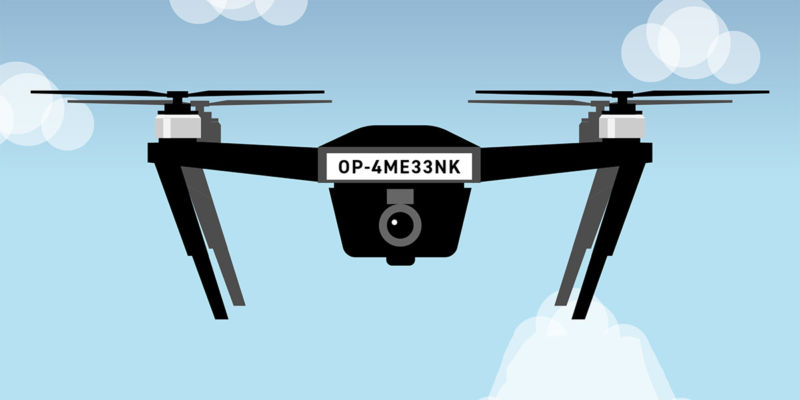There are lots of factors that new drone pilots need to consider when they prepare for a flight. Whether you’re using a drone for commercial purposes or as a hobby, there are ways to help you make the most of your flying.
Some issues that could occur during a flight, such as technical difficulties, are easy to prevent with a little preparation. These tips will help you to avoid problems and optimise your flight time.

New CAA regulations require pilots to attach their operator ID to their drone
1. Attach Your Operator ID
As of 30 November 2019, the Civil Aviation Authority (CAA) has introduced mandatory regulations which new drone pilots should be aware of, as they apply to both commercial and recreational operators. The new registration system, as well as the CAA’s Drone Code, applies to drones and model aircraft used outdoors that range from 250g to 20kg.
If you are responsible for a drone – meaning that you have control of how it is used – you must register as an operator. You’ll gain a certificate of registration, as well as an Operator ID which must be displayed on your drone. Pilots who own more than one drone can use the same Operator ID for each. Operators must be aged 18 or over to register for their ID, which costs £9 and is renewed annually.
Anyone who wants to fly a drone must gain their Flyer ID. To do this, you must pass an online theory test on flying safely and legally. There is no minimum age needed for a Flyer ID, though anyone aged under 13 who wants to register must have a parent or guardian present.

New EASA legislation will have different categories for drone flights
2. Learn the New EASA Rules
The European Aviation Safety Agency (EASA) has outlined new legislation for drone operations. Guidelines on how to categorise flights, which are based on a drone classification system, have also been introduced. This means that flights are likely to be evaluated according to the type of operation that a pilot undertakes.
In addition to the new rules, there will be a new name given to drone training organisations. Previously referred to as a National Qualified Entity (NQE), approved training centres will now be known as a Recognised Assessment Entity (RAE). This system also introduces new qualifications, making changes to the training of commercial drone pilots. Whether you fly for business or for fun, it’s worth making sure you’re aware of the changes that are being made to drone legislation.

Extra batteries can be crucial when flying
3. Carry Extra Batteries
It’s easy to overlook or forget what seems like a minor detail – but factors such as batteries can impact your operations. For commercial pilots, carrying extra batteries is crucial. Pilots should carry enough batteries to last for their required flight time – and even include some extra in case of emergency!
If you’re flying in cold temperatures, remember that batteries need to stay warm to work effectively. Your drone depends on batteries, so it’s important to make sure you have enough – and that they work!

Drone insurance means you’re protected if accidents occur
4. Get Drone Insurance
New drone pilots, whether recreational and commercial, should consider insuring their drone. Accidents can happen, and if damage occurs or you lose your drone, the insurance will work like any other policy.
If you are a commercial pilot, you are legally required to insure your drone. Even if you fly recreationally, having insurance makes sure you’re protected if an accident were to happen. An insurance company will cover your damage and liability costs to a certain amount.
Drone insurance policies offer many protection plans. These can cover drone damage, payloads, ground equipment, personal injury, and more.
Many companies now offer specialist insurance for drones, so it’s easy to find a policy that suits you. Some companies, such as Coverdrone, even specialise in protecting commercial and recreational drone operators. Safeguard yourself, your drone, and even your business by making sure that you’re covered for the work you undertake.

Flying as part of a crew improves the safety and efficiency of your flights
5. Fly With a Friend
Whether you fly drones as a hobby or as part of your business, it’s always a good idea to fly with another person present.
Operating your drone as part of a crew – even if this consists of 2 people – has a lot of benefits to both the pilot and the overall operation.
The main advantage of operating your drone with a crew is the fact that more people will be available to look out for the drone, as well as its surroundings – whilst also identifying any potential hazards.
This level of assurance benefits operators, especially new drone pilots. Having another person on hand to watch out for risks will mean that flying time is safer and more enjoyable.

Training in thermal imaging is one way drone pilots can widen their skills
6. Expand Your Skills
Gaining further training can help you to become a better operator. For new drone pilots getting your PfCO is a great first step – but it is likely that other commercial pilots will have done the same. Investing in your education, and developing your skills and knowledge, makes sure you stand out from the crowd.
Many new pilots have a specific use for their drone in mind, such as aerial photography or surveying. Whilst training can help pilots to enhance their existing skills in these areas, it can also lead to the discovery of new applications.
There are many areas with a demand for drone technology, as well as the use of remote sensors on drones. Pilots can use specialist sensors on a drone for many commercial purposes. These include aerial surveys and inspections, agricultural inspections, and search and rescue missions.
Pilots who already utilise their drone for a certain application, as well as recreational flyers who want to expand their skills, can benefit from further training and the opportunities this creates.

Social media and other online platforms are a great way to advertise your services
7. Advertise Your Services
If you’re a commercial pilot, advertising is a great way to make people aware of your business and the services you have to offer. There are many ways that you can promote your business; this includes creating business cards, or placing adverts in a local paper or directory where clients can find you.
Using social media can also be a great way to advertise your services. There are a number of platforms that you can use to create and boost your audience. You’ll also be able to share content that promotes the work you do – including great reviews from customers and examples of your work. This all helps to boost your brand and encourage new business.

Landing pads have lots of benefits for commercial and recreational pilots
8. Bring a Landing Pad
Pilots can also choose to use a landing pad, which have benefits in terms of both location and safety. For example, if their landing pad is rigid, a pilot can use it to ensure that their drone is level before take off. The pilot can also choose to align their pad to north, acting as a basic compass on the ground. A landing pad also clearly denotes where the drone will take off and land, so it becomes a useful marker to people who are not involved in the flight itself.
Landing pads also help to protect a drone. Foreign objects such as twigs, leaves and plastic bags can all damage your system, and the use of a landing pad can prevent this. As well as this, a landing pad can reduce dust or other debris from being blown onto a camera or sensor lens during take off or landing.
The iRed Academy for New Drone Pilots
Whether you operate commercially or as a hobby, it’s worth making sure you’re prepared for any issues. These tips are useful for new drone pilots to keep in mind whenever they fly.
The iRed Academy offers a range of training courses which help drone pilots of any level and experience to further their skills and knowledge – and even discover new industries. Find our upcoming courses here: https://ired.ac.uk/courses/
iRed is also a DJI Enterprise and FLIR Premium Partner, providing specialist drones and sensors nationwide. Visit the iRed Store to buy or hire the latest in drone technology: https://store.ired.co.uk/

